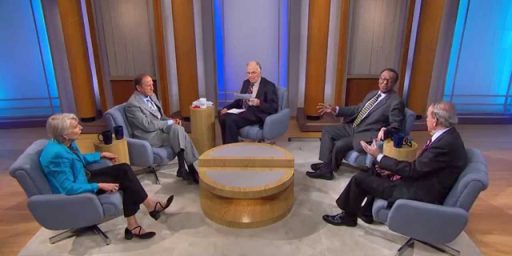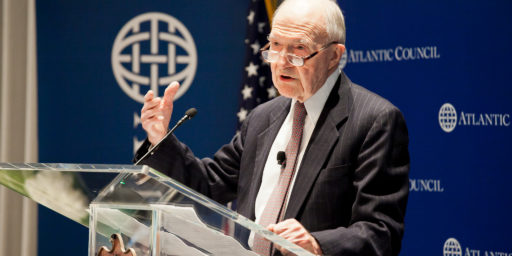Next CIA Director, Redux
The New Republic gets into the guessing game, assessing the usual suspects plus a couple of mild surprises.
Then there is the confirmation process, which promises to be brutal. “This is going to be a very hot nomination confirmation process,” Senator Dianne Feinstein told ABC’s “This Week” on Sunday. It’s not even clear whom the new CIA director will report to down the road, given that a proposal to create a new Director of National Intelligence (DNI) and install that person over the CIA director’s head is receiving serious consideration. If created, the DNI position would oversee the intelligence community’s 15 agencies and $40 billion budget; currently, the CIA only controls about 12 percent of the intelligence budget, while the secretary of defense oversees the rest.
True but misleading. The CIA Director, wearing his Director of Central Intelligence (DCI) hat, has theoretically controlled all those agencies since the creation of the post with the National Security Act of 1947. It’s budgetary control that’s the issue although, to be fair, it should be noted that part of the reason the SecDef controls such a huge chunk of the budget is that it contains the National Reconnaisance Office, which is phenomenally expensive even though it’s rather small.
The following is a redaction of the choices and the bottom line assessments; the actual article contains a paragraph or two on each one (no circles and arrows, however).
Porter Goss: Speculation is that Goss, a former CIA operative for nine years, an eight-term Republican congressman, and chairman of the House Intelligence Committee, tops Bush’s list of candidates for the post.
Bottom line: If Bush is looking to pick a protracted political fight–and it wouldn’t be the first time–Porter Goss is his man.
Odds: 3:1Michael Hayden: Since 1999, Hayden has commanded the National Security Agency (NSA).
Bottom line: The CIA may be ready for an outsider like Hayden. But is Hayden ready for such a high-profile political position?
Odds: 7:1Richard Armitage: If Bush is looking for a career diplomat, he need look no further than his own deputy secretary of state, a man who has largely floated below the public radar since his government career began in the 1960s.
Bottom line: Bush might have to twist Armitage’s arm to get him to take the position, which won’t be easy given that he can reportedly bench press 400 pounds.
Odds: 10:1John Lehman: The main advantage Lehman has is that he’s a member of the 9/11 Commission, which puts him in the thick of investigating the intelligence bureaucracy and recommending changes.
Bottom line: Even Bush might think Lehman too conservative and cavalier with his words to get through the nomination process. Then again, you never know.
Odds: 12:1Sam Nunn: In his 24 years as a senator, Sam Nunn gained a reputation as a politician who can cut through politics to enact reforms.
Bottom line: Nominating Nunn would be a gamble for an administration that wants everyone to tow its line.
Odds: 15:1Brent Scowcroft: A retired Air Force general, Scowcroft served five presidents and is the only person to have served two presidents–Ford and Bush I–as national security advisor.
Bottom line: Scowcroft may be too much of a reformer and free thinker for either Bush or Rumsfeld to handle.
Odds: 15:1John McLaughlin: A 34-year career CIA employee, McLaughlin became acting CIA director with Tenet’s resignation.
Bottom line: McLaughlin will need to pull out all the tricks in his book to remain as CIA director.
Odds: 30:1



